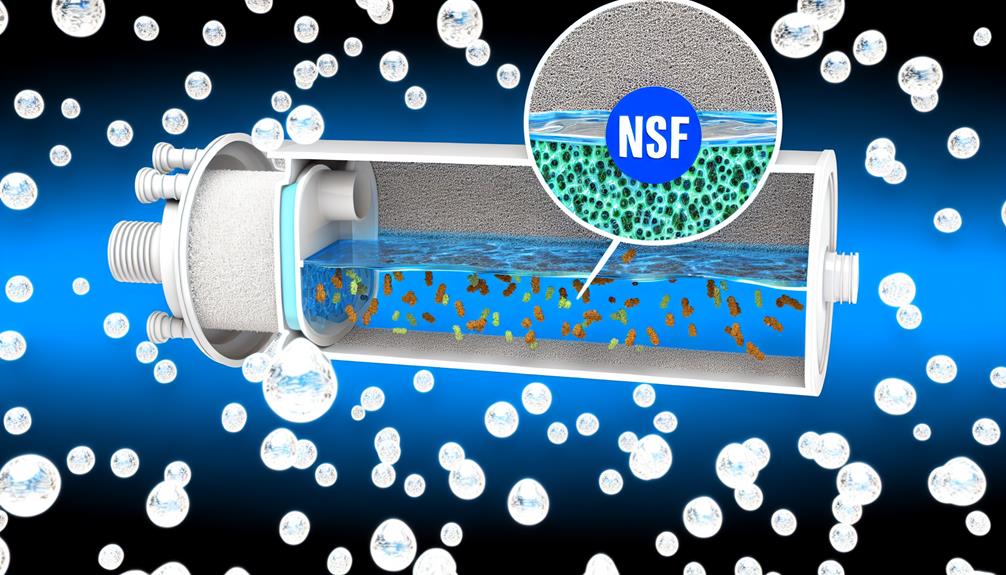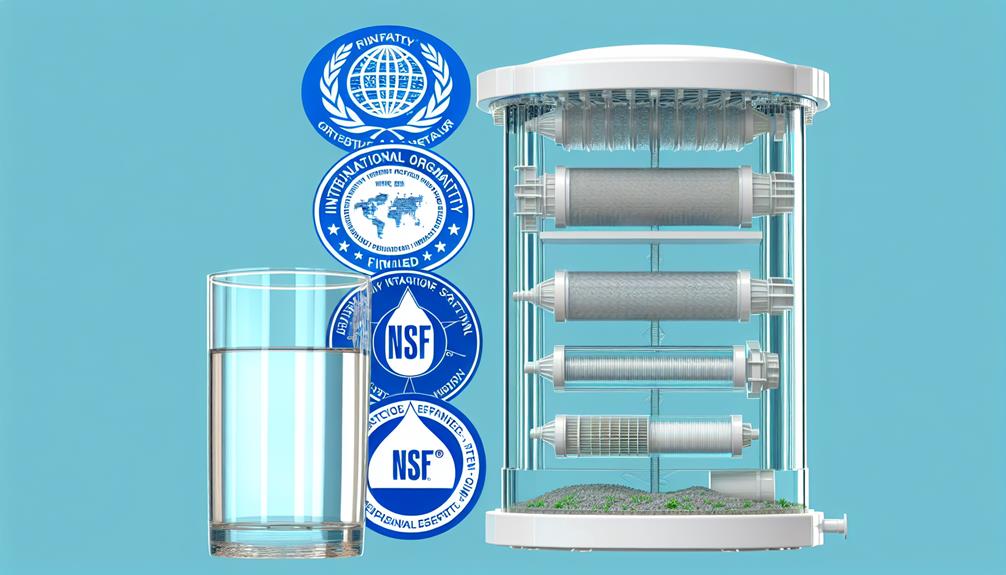As a shield in a knight's hand protects against threats, so do certifications stand guard over the purity of your drinking water.
You're aware of the dangers lurking in unfiltered tap water, and you've decided to armor your home against them. Lead, a formidable adversary to health, requires a special kind of defense. Certifications such as NSF/ANSI Standard 53 and 58, WQA Gold Seal, and California Prop 65 Compliance aren't just badges of honor; they're your assurance that a water filter will live up to its promise of lead removal.
But with so many certifications out there, you might wonder which shields are strong enough to trust. Stay with this conversation as we unravel the fabric of these prestigious certifications, helping you understand their significance and how they can impact the well-being of your water.
NSF/ANSI Standard 53
To ensure the effectiveness of lead removal, water filters must possess certification in accordance with NSF/ANSI Standard 53. This certification is a critical indicator that the filter has been rigorously tested and meets the specific requirements for health effects, particularly for lead reduction.
When you're on the hunt for a water filter, it's imperative to check for the NSF/ANSI Standard 53 certification label on the package. This label isn't just for show; it's a guarantee that the filter you're considering has passed the necessary evaluations to ensure it can effectively remove lead from your drinking water.
Filters certified to NSF Standard 53 undergo a series of meticulous tests to validate their performance. These Drinking Water Treatment Units are scrutinized against a set of criteria that determine their capability to mitigate potential health effects by reducing contaminants, with lead being a primary concern due to its toxicity.
NSF/ANSI Standard 58
When evaluating the effectiveness of reverse osmosis filtration systems for lead removal, it's crucial to look for NSF/ANSI Standard 58 certification. This distinction ensures the filter meets stringent quality standards for eliminating lead from your water. NSF/ANSI Standard 58 is the benchmark for ensuring that reverse osmosis systems are capable of reducing contaminants, including lead, which poses serious health risks when present in drinking water.
Reverse osmosis systems with NSF/ANSI Standard 58 certification have undergone rigorous testing to validate their performance. This certification isn't just a superficial label but a guarantee that the system will perform as advertised in lead removal. If you encounter a reverse osmosis filter without this certification, there's no assurance it will provide the necessary protection against lead.
Moreover, the NSF/ANSI Standard 58 certification indicates that a filter not only reduces lead effectively but also meets established quality standards. This includes ensuring that materials and components are safe and don't leach harmful substances into the water. As you consider your options for lead removal, prioritize filters that boast NSF/ANSI Standard 58 certification to ensure you're choosing a product that delivers on its promises for lead-free, safe drinking water.
NSF/ANSI Standard 42
While NSF/ANSI Standard 58 assures your reverse osmosis system's effectiveness in lead reduction, NSF/ANSI Standard 42 focuses on enhancing water aesthetics by reducing non-health-related impurities such as chlorine and odor. This certification standard guarantees that the filter you're considering can effectively improve the taste and smell of your water.
When you opt for an NSF certified filter adhering to NSF/ANSI Standard 42, you're choosing a product that's been rigorously tested to ensure it reliably reduces chlorine and similar contaminants that affect water's sensory qualities.
It's important to note that NSF/ANSI Standard 42 doesn't address the removal of health-related contaminants like lead. For that, you'll need to look for a filter with NSF/ANSI Standard 53 certification.
Still, NSF/ANSI Standard 42 is a key element in the overall improvement of water quality. Typically, filters meeting this standard contain activated carbon, which is effective in removing unwanted tastes and odors.
WQA Gold Seal Certification
You'll want to consider the WQA Gold Seal Certification as a benchmark for health safety and performance in lead removal water filters.
This certification indicates that a product has met specific criteria, ensuring it effectively reduces lead and safeguards your health.
Certified filters have passed rigorous testing, offering you a reliable choice for clean water.
Certification Criteria
To ensure the effectiveness of lead removal, water filters must adhere to the rigorous standards set by NSF International, including compliance with NSF Standard 53 which the WQA Gold Seal Certification uses as part of its certification criteria.
When you're selecting a water filter, you should look for the package to explicitly state that the device is certified for lead removal. This certification is your assurance that the filter has undergone stringent testing and certification processes to meet the quality standards established by NSF certifications.
The NSF Contaminant Guide can be a vital resource for verifying which filters are certified.
It's crucial to understand that filters lacking NSF certification mightn't effectively remove contaminants, potentially leaving your water unsafe for consumption.
Health Safety Assurance
When selecting a water filter, ensure it boasts the WQA Gold Seal Certification, a testament to its rigorous testing for health safety and its proven effectiveness in lead removal. This certification guarantees that the filter not only meets but often exceeds the requirements set by the Safe Drinking Water Act (SDWA).
It's also an assurance that the product adheres to specific NSF/ANSI standards, which are critical benchmarks in the water treatment industry. The National Sanitation Foundation (NSF) develops these standards to establish minimum requirements for the safety and performance of water treatment products.
IAPMO Certification Process
You must understand that the IAPMO certification process is a comprehensive system designed to evaluate the efficacy and safety of lead removal water filters.
It begins with an assessment against established IAPMO certification standards, followed by a rigorous testing protocol to scrutinize the filter's performance.
Lastly, the process mandates periodic renewal requirements to ensure sustained compliance and protection for consumers.
IAPMO Certification Standards
Ensuring the efficacy of your water filter in removing lead and other contaminants, the IAPMO Certification process rigorously tests and evaluates products against established quality and performance criteria.
When you see a filter that's IAPMO certified to NSF standards, you can trust it meets stringent requirements.
The International Association of Plumbing and Mechanical Officials (IAPMO) certifies products to safeguard public health by:
- Confirming compliance with specific NSF/ANSI standards for lead removal efficiency.
- Verifying that materials used don't leach harmful substances into the water.
- Ensuring the filter maintains performance over its advertised lifespan.
- Requiring regular retesting and surveillance to uphold certification status.
Testing Protocol Overview
The IAPMO certification process commences with a series of stringent tests to ascertain that water filters not only meet, but also maintain, the required standards for effectively removing lead and safeguarding water quality. Each filter undergoes a rigorous testing protocol overview to confirm it performs reliably over time. You can trust a filter certified by NSF through the IAPMO process, as it ensures compliance with the stringent requirements for lead removal, as set by the industry.
This certification indicates that the water filter has been subjected to comprehensive evaluations, simulating real-world conditions to verify its effectiveness. As a result, when you choose a filter with IAPMO certification, you're selecting a product recognized for its capacity to provide clean, lead-free water consistently.
Certification Renewal Requirements
Regular renewal of IAPMO certification is mandatory for water filters to maintain compliance with industry standards for lead removal. This rigorous process ensures your product remains certified to NSF/ANSI standards, which are developed in conjunction with the American National Standards Institute.
As you navigate the renewal process, you'll encounter a few critical steps:
- Submitting updated product information and test results for review
- Providing current quality control documentation
- Undergoing periodic retesting to verify consistent performance
- Complying with on-site audits to confirm manufacturing and quality management systems
These measures, endorsed by the Water Quality Association, are essential to uphold the integrity and public trust in the effectiveness of your lead removal water filters. Each step is a testament to your commitment to excellence and consumer safety.
California Prop 65 Compliance
To meet California's rigorous health standards, water filters require certification for Prop 65 compliance, signifying their efficacy in reducing lead and other contaminants to safe levels. You must ensure that the water filter you select isn't only tested and certified by recognized bodies but also adheres to the strict parameters set forth by California's Proposition 65. This law mandates clear labeling and warnings for products that may expose consumers to a list of chemicals known to the state to cause cancer, birth defects, or other reproductive harm.
The Safe Drinking Water Act (SDWA) sets the federal context, while California Prop 65 takes it a step further, focusing on a broader spectrum of chemicals and often imposing more stringent standards for lead removal. To verify compliance, filters should bear credentials from accredited institutions, such as the International Association of Plumbing and Mechanical Officials (IAPMO), which assures that they've been rigorously evaluated.
When you're in the market for a water filter, specifically look for those labeled as California Prop 65 Compliant. This is more than just a label—it's your assurance that the filter effectively reduces lead to safe, legal levels, safeguarding your drinking water against potential health hazards.

